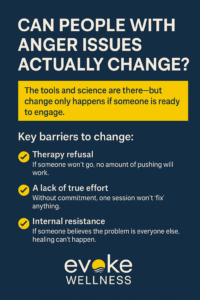When someone you love lashes out—again—it’s hard not to start believing the worst. The slammed door, the cold silence, the way their voice morphs into something unrecognizable. You start wondering: Is this just who they are?
But here’s a truth many families aren’t told soon enough: anger is a symptom. Not a sentence. Not a sign of moral failure. Not a monster mask hiding someone incapable of love.
Anger, especially when it turns explosive or cruel, feels terrifying and unsafe. And it can be dangerous. But it doesn’t always mean the person is dangerous by nature. In many cases, it means they’re unwell, overwhelmed, and running on a nervous system that hasn’t known peace in years—if ever.
Understanding what’s behind the rage won’t fix everything. But it can open up a different path forward. One with clearer choices, less shame, and more actual help.
Anger Is a Reaction, Not an Identity
Let’s get something straight: anger itself isn’t bad. It’s not toxic. It’s not something to suppress. Anger, in its healthy form, is a signal. It says: I’ve been hurt. I need protection. Something is wrong.
But for people who have never had a safe space to express fear or sadness, anger becomes the only language their nervous system knows. It’s fight mode. It’s armor. And when it becomes chronic, volatile, or explosive—it stops being protective and starts being destructive.
That’s when it turns into a pattern. A problem. A source of pain not just for the person struggling, but for the people who love them.
And it’s why “just walk away” advice often falls flat. Because when love and fear live in the same household, the line between holding on and staying safe can get blurry fast.
The Real Damage of Stigma Around Anger
Here’s what makes anger harder to heal than anxiety or depression: shame. Not just personal shame, but cultural shame.
People who lash out are labeled as unstable, scary, or beyond help. The internet loves to slap labels like “narcissist” or “abuser” on every difficult behavior. And while those labels do apply sometimes—too often, they’re used like grenades instead of tools. That creates silence. And silence breeds stuckness.
Many people with anger issues already feel out of control. The more they’re treated like monsters, the more likely they are to give up on getting help—or to believe help won’t work for them.
At the same time, loved ones—especially partners or adult children—often feel like they’re walking on eggshells. Afraid to speak up. Afraid to leave. Afraid to stay. Stigma doesn’t just hurt the person struggling with anger. It traps everyone in the blast zone.
So What’s Actually Behind All That Rage?
Anger issues are never just about “a bad temper.” That’s like calling a wildfire a “spark problem.”
Here’s what’s often fueling the fire:
- Unresolved trauma – People with a history of childhood abuse, neglect, or chaotic environments often grow up emotionally dysregulated.
- Attachment wounds – If someone never learned safe connection, they might associate closeness with threat.
- Buried shame – Chronic internalized shame can lead to defensive anger, especially when someone feels exposed or not in control.
- Mental health conditions – Mood disorders, PTSD, and certain neurological conditions can all cause irritability or explosive episodes.
- Modeled behavior – If someone grew up with yelling, silence, or punishment as the norm, they may literally not know another way.
That doesn’t make it your responsibility. But it does mean the problem is complex—and treatable.
What Happens in Anger Management Therapy?
Anger management therapy is not about “calming down” or repeating mantras. It’s real, clinical work. And it can absolutely change lives—if someone is ready to engage.
Anger Management Therapy At Evoke Wellness involves:
- Identifying triggers and thought distortions – What happens right before the outburst? What story is the brain telling in that moment?
- Practicing regulation strategies – These include somatic techniques, grounding skills, and real-time emotion management.
- Challenging core beliefs – Many clients uncover deep-rooted fears like “I’m weak if I don’t control everything” or “If I let people close, they’ll leave.”
- Building repair skills – Learning how to apologize, take ownership, and rebuild trust is part of treatment—not an afterthought.
Therapy doesn’t excuse behavior. It creates accountability with tools. It shows people how to respond, not just react.
If your loved one isn’t ready yet, that doesn’t mean you’re stuck. Therapy can support you in setting boundaries, processing fear, and healing from relational trauma—even if they never walk through our doors.
You’re Allowed to Stay—and You’re Allowed to Go
Maybe they yelled last night. Maybe you’re reading this from the driveway, too afraid to go back in.
You’re not overreacting.
This is not your fault.
And you don’t have to pick between “love them forever” or “cut them off cold.” There are ways to protect your heart and your body. There are ways to draw lines that don’t feel like punishment—but that still keep you safe.
People can change. But only if they want to. You don’t have to wait around to earn your peace.
Whether you stay, leave, or don’t know yet—you deserve support.
You Don’t Have to Figure It Out Alone
You don’t need a perfect plan. Just a place to talk it through.
If you want to know whether anger management therapy might help someone you care about—or you need to talk through your own next steps—our team is here to listen.
Call Evoke Wellness at (866) 429-2960 or read more about our anger therapy options.
You’re not crazy. You’re not broken. You’re allowed to want peace.
FAQ: Anger, Therapy, and What Comes Next
What if my loved one refuses therapy?
That’s common—and painful. You can still get support. Individual counseling, family therapy, and psychoeducation can all help you cope and make decisions rooted in clarity instead of fear.
Can someone with anger issues really change?
Yes. But only if they want to. The tools exist. The science supports it. We’ve seen it work. But they have to engage—and stay engaged. That’s not something you can force, but you can watch for signs of real effort.
Is anger ever a sign of something more serious?
Absolutely. Explosive anger can be linked to PTSD, mood disorders, personality disorders, and neurological conditions. That’s why a full clinical assessment is often the first step in treatment.
What if the anger turns violent?
Safety comes first. Every time. If you ever feel physically unsafe, trust that instinct. Reach out to a domestic violence hotline or therapist who understands trauma dynamics. Therapy can’t work if someone is being harmed.
How do I set boundaries without making things worse?
This is where support helps. A therapist can help you script boundaries that are clear, kind, and enforceable. Boundaries aren’t ultimatums—they’re tools for protecting what matters.



